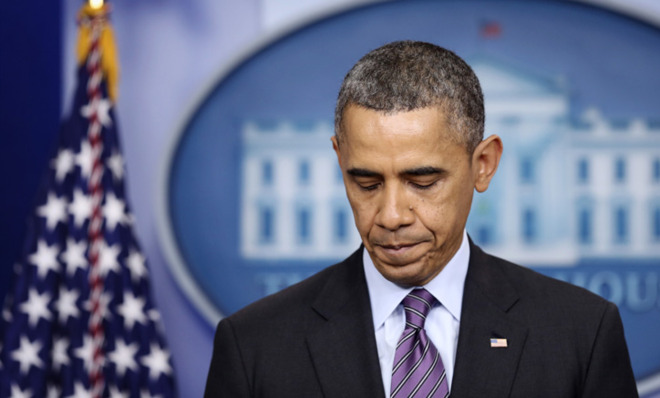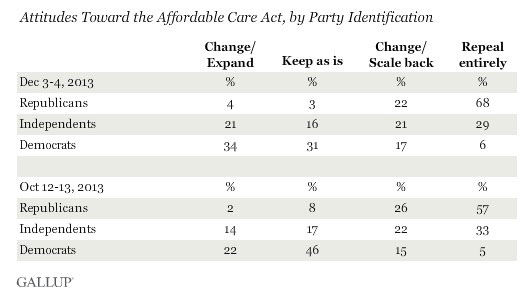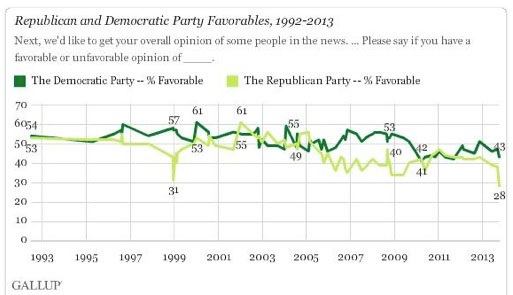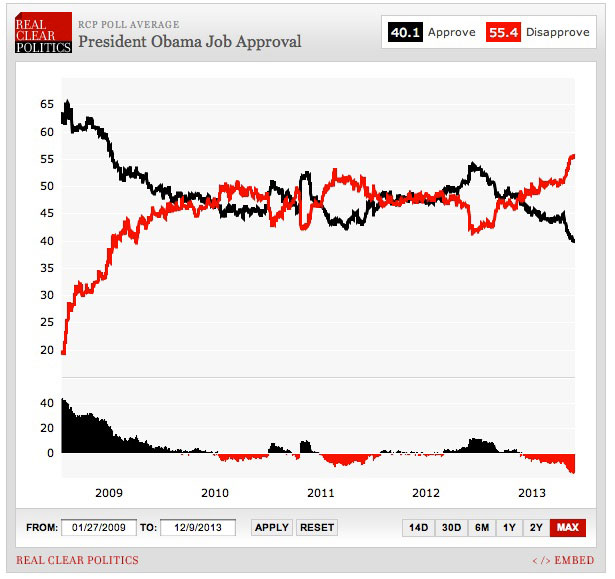Why Republicans shouldn't get too excited over Obama's stumbles
Polls actually show the GOP losing ground in key areas


A free daily email with the biggest news stories of the day – and the best features from TheWeek.com
You are now subscribed
Your newsletter sign-up was successful
One story line of the 2014 campaign (and no doubt the presidential race in 2016 itself) will go like this: ObamaCare, Republicans will shout, has been a disaster thus far and underscores the broader argument that big government programs — Democratic programs — can't solve complex social problems in 21st-century America. For this reason, they say, everyone should vote Republican.
Democrats will counter: Government can indeed solve big, complex problems, and the long-term success of Franklin Roosevelt's Social Security and Lyndon Johnson's Medicare proves it. And what of ObamaCare, then? Democrats obviously concede that it is off to a rocky start, but that's a short-term matter. Many think that a generation from now Barack Obama's dream will be as deeply ingrained into the American fabric as FDR and LBJ's creations are today. They're looking beyond the wobbly, but short-term rollout.
In capitalizing on ObamaCare's poor execution, Republicans think they've found an election-swaying issue. Some have convinced themselves that we're headed for a wave election, like in 2010 when the GOP seized control of the House. Republicans are also increasingly confident that they can pick up six seats in the Senate, enough to win a majority — and there are seven vulnerable seats now held by Democrats in states won by Mitt Romney last year. If Republicans pick up six Senate seats, then they can really put the screws to Obama during his last two years as president.
The Week
Escape your echo chamber. Get the facts behind the news, plus analysis from multiple perspectives.

Sign up for The Week's Free Newsletters
From our morning news briefing to a weekly Good News Newsletter, get the best of The Week delivered directly to your inbox.
From our morning news briefing to a weekly Good News Newsletter, get the best of The Week delivered directly to your inbox.
This interpretation by both sides is rather simplistic and superficial and belies a more detailed analysis.
Let's look at the Republicans first. In their glee over the struggles of ObamaCare, they seem to forget (or ignore) a few things:
1. The overall view of ObamaCare has actually improved slightly, despite the messy rollout.
The Heritage Foundation is trumpeting a new Gallup poll that says 52 percent of Americans want the Affordable Care Act scaled back or repealed altogether. But Heritage somehow missed the part saying that figure is actually down from 57 percent in Jan. 2011. Even so, that's a majority who don't like it.
A free daily email with the biggest news stories of the day – and the best features from TheWeek.com

2. Independents — the biggest voting bloc — are edging toward Democrats on ObamaCare.
In October, 31 percent of independents, according to the Gallup survey, wanted to expand ObamaCare or keep it as it is. Today: 37 percent. The percentage who want to scale it back or repeal it altogether is 50 percent, down from 55 percent in October. This despite the embarrassing incompetence surrounding the rollout.

This suggests that even as Democratic and Republican positions harden on the left and right (as usual), swing voters in the middle, are beginning to drift towards the Democratic camp. The GOP notion that they're on the winning side of an election-changing issue here may be presumptuous.
3. Residual anger at Republicans hasn't gone away
It was only two months ago that it was Republicans who were in the doghouse, having taken the lion's share of the blame over the government shutdown. Just 28 percent of Americans have a favorable view of the GOP, Gallup says, a record low. Campaigning against ObamaCare will galvanize the GOP base in November. But Republicans will have to broaden their appeal beyond this one issue if they hope to soak up independent voters next Fall.

Graph: Bloomberg
Now for the Democrats. The rollout of ObamaCare has been an embarrassing fiasco, and the political damage continues to radiate:
1. Record low approval ratings for the President.
Today's Real Clear Politics average of seven recent polls puts his approval at 40.1 percent, a low point for him. How bad is it for Mr. Obama? Many Democratic candidates up for re-election next year are edging away from him — notably those Democratic senators in red states as mentioned above. Something else that may be telling: Even Vice-President Joe Biden, weighing a presidential run, has begun mentioning Barack Obama a bit less these days. Hillary Clinton, gearing up for a 2016 run, also appears to be placing a bit more distance between herself and her former boss. Interpret as you see fit.

2. The real ObamaCare damage may be about to hit.
All the talk about a few million people having their policies canceled appears to be the tip of the iceberg. I'm guessing you don't read the Federal Register ("the daily journal of the United States Government"), because in June 2010, three months after the Affordable Care Act was signed, administration officials predicted a gargantuan disruption of the private insurance market. Buried on page 34,552 was this:
The Departments' mid-range estimate is that 66 percent of small employer plans and 45 percent of large employer plans will relinquish their grandfather status by the end of 2013. [Federal Register]
How many people is that? The non-partisan Congressional Budget Office (CBO) estimates that 156 million Americans — half the entire U.S. population — is covered by employer-sponsored insurance. There are efforts by some Republicans, and Democrats who are vulnerable next year, to pass a bill making it illegal for any group plan in place prior to this Dec. 31 to be canceled. One bill's name takes dead aim at one of the biggest falsehoods ever uttered by an American president: The "If You Like Your Health Care Plan You Can Keep It Act."
Just as it's preposterous for Democrats to say that the Affordable Care Act represents a solution to one of America's biggest and most complex problems — it has so far resulted in more problems than solutions — it's equally ludicrous for Republicans to say that it's an electoral game changer. And there are other tangibles to be considered that may outweigh any voter ire over ObamaCare: Falling unemployment rates, the falling deficit, rising housing prices, for example. November 2014 is a long way off.
An award-winning member of the White House press corps, Paul Brandus founded WestWingReports.com (@WestWingReport) and provides reports for media outlets around the United States and overseas. His career spans network television, Wall Street, and several years as a foreign correspondent based in Moscow, where he covered the collapse of the Soviet Union for NBC Radio and the award-winning business and economics program Marketplace. He has traveled to 53 countries on five continents and has reported from, among other places, Iraq, Chechnya, China, and Guantanamo Bay, Cuba.
